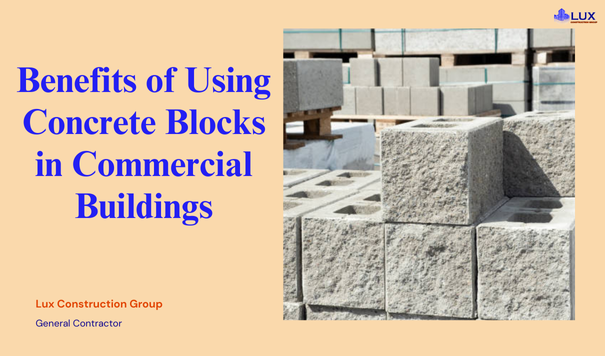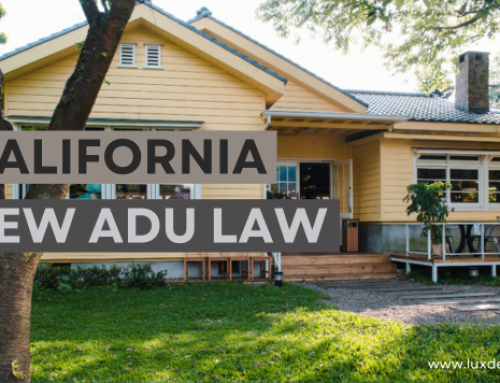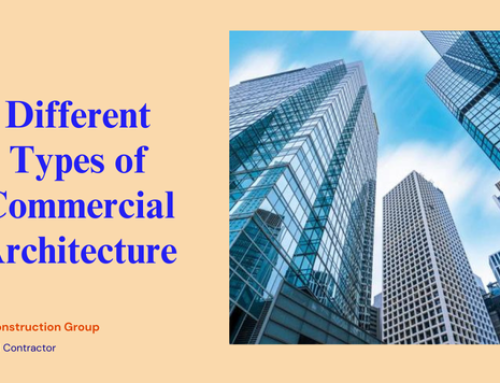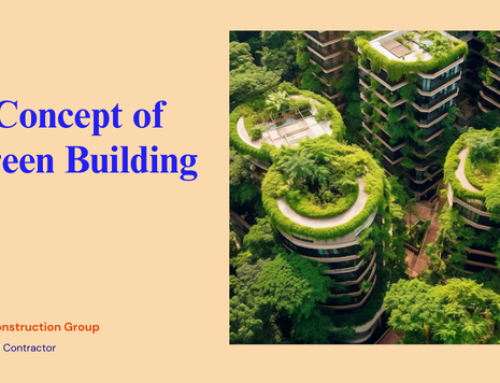Concrete blocks are a fundamental component in the world of construction, especially when it comes to commercial buildings. These sturdy units have been a reliable choice for builders and architects for decades, offering a range of benefits that make them indispensable in modern construction.
In this article, we will explore the top benefits of using concrete blocks in commercial buildings, highlighting why they are preferred over other construction materials.
Concrete blocks are not just basic building units; they are versatile and environmentally friendly materials that contribute to energy efficiency and sustainability. From cost-effectiveness and expandability to aesthetic versatility and durability, concrete blocks meet the diverse needs of commercial construction. Their ability to resist fire and water damage, support heavy loads, and adapt to various design requirements makes them a practical choice for a wide range of projects.
As we delve into the specific benefits, you’ll see how concrete blocks can enhance your commercial building projects, providing long-term value and performance. Let’s take a look!
Contents
- Why Concrete Blocks Are Ideal Choice for Commercial Buildings?
- 1. Cost-Effectiveness: Concrete Blocks are Affordable
- 2. Expandability and Flexibility: Expand Your Building Easily
- 3. Aesthetic Versatility: Design and Aesthetic Benefits
- 4. Durability and Longevity: Long-Term Durability
- 5. Fire and Water Resistance: Safety Benefits of Concrete Blocks
- 6. Load-Bearing Capabilities: Strong Structural Support
- 7. Variety and Customization: Wide Range of Options
- 8. Environmental Benefits: Eco-Friendly and Sustainable
- Summary and Next Steps!
Why Concrete Blocks Are Ideal Choice for Commercial Buildings?
Concrete blocks offer excellent fire and water resistance, ensuring safety and longevity. Their design versatility allows for aesthetic customization, and their structural integrity supports heavy loads without additional framing.
So, let’s discuss in detail these benefits of using concrete blocks in your construction:
1. Cost-Effectiveness: Concrete Blocks are Affordable
One of the biggest advantages of concrete blocks is their cost. Compared to other building materials, concrete blocks are much cheaper. Constructing walls with concrete blocks is less expensive than using materials like wood or steel. Plus, they don’t need a frame, saving even more on labor costs. This affordability makes them a popular choice for commercial buildings.
- Material Costs: Concrete blocks are made from readily available materials such as cement, aggregate, and water, which are relatively inexpensive compared to other building materials. This contributes to their overall cost-effectiveness.
- Labor Costs: The installation of concrete blocks is straightforward and requires less skilled labor compared to other methods like steel framing or bricklaying. This reduces the labor costs associated with construction.
- Maintenance Costs: Concrete blocks are durable and require minimal maintenance over their lifespan, which further reduces the total cost of ownership.
- Energy Efficiency: Concrete blocks have good thermal mass, which helps in reducing heating and cooling costs in commercial buildings. This energy efficiency translates to long-term savings on utility bills.
- Economies of Scale: When building large commercial structures, the use of concrete blocks can lead to significant cost savings due to the economies of scale in both material procurement and labor deployment.
2. Expandability and Flexibility: Expand Your Building Easily
Concrete blocks offer excellent expandability. You can extend commercial buildings upwards or downwards while keeping the same structure. Need to add more stories? Concrete blocks make it easy and affordable. They also allow for custom designs on the exterior, making your building unique.
- Vertical Expansion: One of the standout features of concrete blocks is their ability to support additional stories. This makes it easy to expand a commercial building vertically without compromising the structural integrity.
- Horizontal Expansion: Concrete blocks can also be used to expand buildings horizontally. This modular construction method allows for the seamless integration of new sections into the existing structure.
- Modular Design: The modular nature of concrete blocks means that sections of the building can be designed and constructed in a factory setting before being assembled on-site. This increases construction speed and reduces disruptions.
- Custom Exterior Designs: Concrete blocks can be customized with various finishes, textures, and colors. This allows architects to create unique and aesthetically pleasing designs that meet the specific needs of a commercial project.
- Future-Proofing: Using concrete blocks provides flexibility for future changes and expansions. This is particularly useful for businesses that anticipate growth and need a building that can adapt to their evolving needs.
3. Aesthetic Versatility: Design and Aesthetic Benefits
Concrete blocks aren’t just practical—they’re versatile in design too. You can choose from various finishes, colors, and styles. Whether you want a modern look or something more traditional, concrete blocks can meet your needs without extra costs. Different surface finishes can make your building stand out.
- Variety of Finishes: Concrete blocks can be finished with stucco, paint, or veneer to match the desired aesthetic of the building. This variety ensures that the blocks can fit into various architectural styles.
- Color Options: Concrete blocks are available in a wide range of colors, either through the use of pigments mixed into the concrete or through external finishes. This allows for greater creative freedom in design.
- Texture and Patterns: Concrete blocks can be manufactured with different textures and patterns. This adds an extra dimension to the building’s exterior, enhancing its visual appeal.
- Architectural Consistency: Using concrete blocks allows for consistency in the appearance of the building, even when expansions or modifications are made. This ensures a cohesive look throughout the structure.
- Integration with Other Materials: Concrete blocks can be easily combined with other building materials such as glass, wood, and metal. This integration can create striking visual contrasts and innovative design elements.
4. Durability and Longevity: Long-Term Durability
Concrete blocks are incredibly durable. They withstand wear and tear better than many other materials. This durability means your building will stand the test of time, providing long-term benefits. Concrete blocks are made to high standards, ensuring they last for years.
- Resistance to Weather Conditions: Concrete blocks are highly resistant to various weather conditions, including extreme heat, cold, and moisture. This makes them suitable for all climates.
- Structural Integrity: Concrete blocks are known for their strength and stability. They provide excellent load-bearing capacity and structural integrity, which is essential for commercial buildings.
- Low Maintenance: The durability of concrete blocks means that they require minimal maintenance. They do not warp, rot, or attract pests, which reduces the need for frequent repairs and replacements.
- Fire Resistance: Concrete blocks have a high level of fire resistance. They can withstand high temperatures and help in preventing the spread of fire, ensuring the safety of the building and its occupants.
- Longevity: Buildings constructed with concrete blocks have a long lifespan. They remain structurally sound and maintain their aesthetic appeal for many years, making them a wise investment for commercial properties.
5. Fire and Water Resistance: Safety Benefits of Concrete Blocks
One of the key safety benefits of concrete blocks is their fire resistance. They can be made with materials that remain inert during a fire, making them ideal for buildings near airports or chemical plants. Additionally, concrete blocks are highly water-resistant. They withstand harsh weather and won’t rot, ensuring minimal water damage and easy fixes.
- Fire Resistance: Concrete blocks are non-combustible and can withstand high temperatures. This makes them an excellent choice for fireproofing buildings. They help contain fires and prevent them from spreading, which is crucial for commercial safety.
- Water Resistance: Concrete blocks are impervious to water. They do not absorb moisture, which prevents issues like mold and mildew. This makes them ideal for buildings in areas prone to heavy rainfall or flooding.
- Rot and Pest Resistance: Unlike wood, concrete blocks do not rot or attract pests such as termites. This ensures that the structural integrity of the building is maintained over time.
- Weatherproofing: Concrete blocks provide excellent protection against weather elements. They can withstand extreme weather conditions, including hurricanes and earthquakes, making them a reliable choice for commercial buildings.
- Improved Indoor Air Quality: The water-resistant properties of concrete blocks prevent the growth of mold and mildew, which can improve indoor air quality and create a healthier environment for occupants.
6. Load-Bearing Capabilities: Strong Structural Support
Concrete blocks excel in load-bearing capabilities. Unlike materials that require a frame, concrete blocks can support a building on their own. This makes them ideal for commercial buildings that need to be sturdy and reliable. Concrete blocks are often filled with sand or gravel, adding extra strength.
- High Load-Bearing Capacity: Concrete blocks can support heavy loads without the need for additional framing. This makes them ideal for multi-story buildings and structures that require significant support.
- Stable Foundation: Concrete blocks provide a stable and robust foundation for buildings. They distribute weight evenly and prevent settling or shifting, which can compromise the structural integrity.
- Versatility in Design: The strength of concrete blocks allows for versatile design options, including large open spaces without the need for internal support columns.
- Seismic Resistance: Concrete blocks are known for their seismic resistance. They can absorb and dissipate the energy from earthquakes, reducing the risk of structural damage.
- Flexibility in Construction: Concrete blocks can be easily cut, shaped, and customized on-site to fit specific design requirements. This flexibility enhances their load-bearing capabilities and adaptability to various construction needs.
7. Variety and Customization: Wide Range of Options
Concrete blocks come in a vast variety. There are over 100 different types, shapes, and sizes, allowing you to find the perfect style for your building. Some concrete blocks can even mimic the appearance of natural stone, providing aesthetic flexibility along with structural benefits.
- Different Shapes and Sizes: Concrete blocks are available in various shapes and sizes, including standard rectangular blocks, curved blocks, and specialty shapes. This variety allows for creative and functional design solutions.
- Surface Textures: Concrete blocks can be manufactured with different surface textures, such as smooth, split-face, and ribbed. These textures add visual interest and can be used to create unique architectural features.
- Customizable Colors: Concrete blocks can be colored using pigments or stains to match specific design requirements. This customization ensures that the building’s exterior complements its surroundings and meets aesthetic goals.
- Specialty Blocks: There are specialty concrete blocks designed for specific purposes, such as insulating blocks for improved thermal performance, soundproofing blocks for noise reduction, and decorative blocks for enhanced aesthetics.
- Integration with Other Materials: Concrete blocks can be easily combined with other building materials, such as glass, metal, and wood, to create distinctive architectural designs. This integration enhances the overall appearance and functionality of the building.
8. Environmental Benefits: Eco-Friendly and Sustainable
Concrete blocks are not just practical; they’re also eco-friendly. Using concrete blocks can reduce your building’s environmental impact. They are recyclable and often made from sustainable materials, making them a great choice for green building projects.
- Sustainable Materials: Concrete blocks are made from natural and abundant materials, such as limestone and clay. These materials have a low environmental impact compared to synthetic building materials.
- Recyclability: Concrete blocks can be recycled at the end of their life cycle. Crushed concrete can be reused in new construction projects, reducing the need for virgin materials and minimizing waste.
- Energy Efficiency: The thermal mass of concrete blocks helps in regulating indoor temperatures, reducing the need for heating and cooling. This energy efficiency lowers the building’s carbon footprint and utility costs.
- Durability and Longevity: The long lifespan of concrete blocks means fewer resources are needed for repairs and replacements. This durability contributes to the sustainability of the building over time.
- Green Building Certifications: Using concrete blocks can help in achieving green building certifications, such as LEED (Leadership in Energy and Environmental Design). These certifications recognize buildings that meet high environmental and energy performance standards
Summary and Next Steps!
As we have discussed above, concrete blocks offer numerous benefits for commercial buildings. From cost savings and durability to design versatility and environmental benefits, they are a smart choice for any project.
If you’re considering using concrete blocks, contact our team at LUX Construction Group for more information and a free consultation.
Let’s build a better future together with concrete blocks!






